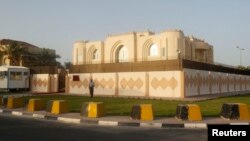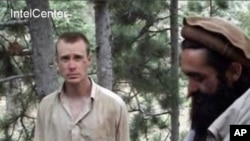KABUL —
The United States is working to defuse the latest dispute with its allies in Afghanistan over contacts with the Taliban office in Doha, the capital of Qatar. The dispute has focused, in part, on the Taliban displaying the flag of the Islamic Emirates of Afghanistan, a symbol of their rule in Afghanistan.
U.S. Secretary of State John Kerry spoke with Afghan leader Hamid Karzai twice in 24 hours to try and rescue plans for peace talks with the Taliban and bilateral security talks with Kabul.
Karzai’s government objected to the meetings after the Taliban used their Islamic Emirates of Afghanistan flag at the Doha office - a move that Afghans saw as the militant group attempting to establish itself as a legitimate government.
U.S. talks with the Taliban had been expected to start Thursday in Qatar. A U.S. State Department spokeswoman said Qatar’s Ministry of Foreign Affairs had intervened, and the banner was replaced with one saying, “Political Office of the Afghan Taliban.”
But by Thursday afternoon, the Afghan leadership did not appear to be satisfied.
Presidential Palace spokesman Eimal Faizi said, "Our position has not changed, neither on sending the Afghan High Peace Council to Qatar for the peace talks, nor on the talks with the United States.”
When the U.S. said Tuesday that talks with the Taliban would go ahead, Mr. Karzai reacted by suspending talks with Washington on bilateral security issues.
Wadir Safi, a professor of political science at Kabul University, says the reconciliation process is not something that will happen overnight. But he predicts the latest dispute will be resolved and the talks will continue. The country has no choice, he says.
“They have to. There is no other way except sit and talk to each other," he said. "The Afghans and the Afghan nation is fed up of wars and all of them they want peace. If Karzai hesitated, or the Taliban hesitate that, then it will be a bit worse for each one of them who doesn’t want to go to peace talks.”
The United States, which along with the rest of the coalition forces, intends to withdraw combat troops from Afghanistan by the end of next year, sees talks with the Taliban as the only solution to the conflict.
But so far, the Taliban has refused to speak directly with Mr. Karzai, and the Afghan leader is against Taliban-U.S. negotiations that omit the participation of his government.
The Afghan government also criticized neighboring Pakistan, which had said it would attend the talks in Doha. Pakistan, which is believed to have ties with the Afghan Taliban, is seen as a vital player in the peace process.
In a statement, the Afghan Foreign Ministry accused Pakistan of harboring some militant Taliban leaders while jailing others - a possible reference to those Taliban who had reached out to Karzai’s government. The statement demanded the release of those imprisoned leaders.
Pakistan’s Foreign Ministry spokesman Aizaz Ahmed Choudhry insisted Islamabad backs the peace process.
-U.S. Army sergeant, was ranked private at time of his capture
-Disappeared from army base in Paktika province, Afghanistan in June 2009
-Been seen in several videos released by Taliban to prove he is alive
-Taliban initially demanded $1 million and release of 21 Afghan prisoners for his release
-Born March 28, 1986 in Sun Valley, Idaho
“Pakistan has extended its facilitation in the process of reconciliation in Afghanistan. This is part of our overall objective, of working with all stakeholders to bring peace and security in Afghanistan, and we think that the reconciliation process will be a central element of that effort,” he said.
The Taliban has indicated that part of the talks in Qatar would include the possible release of U.S. Army Sgt. Bowe Bergdahl, held by the militant group since 2009, in exchange for the release of five prisoners held by the U.S. at Guantanamo.
U.S. Secretary of State John Kerry spoke with Afghan leader Hamid Karzai twice in 24 hours to try and rescue plans for peace talks with the Taliban and bilateral security talks with Kabul.
Karzai’s government objected to the meetings after the Taliban used their Islamic Emirates of Afghanistan flag at the Doha office - a move that Afghans saw as the militant group attempting to establish itself as a legitimate government.
U.S. talks with the Taliban had been expected to start Thursday in Qatar. A U.S. State Department spokeswoman said Qatar’s Ministry of Foreign Affairs had intervened, and the banner was replaced with one saying, “Political Office of the Afghan Taliban.”
But by Thursday afternoon, the Afghan leadership did not appear to be satisfied.
Presidential Palace spokesman Eimal Faizi said, "Our position has not changed, neither on sending the Afghan High Peace Council to Qatar for the peace talks, nor on the talks with the United States.”
When the U.S. said Tuesday that talks with the Taliban would go ahead, Mr. Karzai reacted by suspending talks with Washington on bilateral security issues.
Wadir Safi, a professor of political science at Kabul University, says the reconciliation process is not something that will happen overnight. But he predicts the latest dispute will be resolved and the talks will continue. The country has no choice, he says.
“They have to. There is no other way except sit and talk to each other," he said. "The Afghans and the Afghan nation is fed up of wars and all of them they want peace. If Karzai hesitated, or the Taliban hesitate that, then it will be a bit worse for each one of them who doesn’t want to go to peace talks.”
The United States, which along with the rest of the coalition forces, intends to withdraw combat troops from Afghanistan by the end of next year, sees talks with the Taliban as the only solution to the conflict.
But so far, the Taliban has refused to speak directly with Mr. Karzai, and the Afghan leader is against Taliban-U.S. negotiations that omit the participation of his government.
The Afghan government also criticized neighboring Pakistan, which had said it would attend the talks in Doha. Pakistan, which is believed to have ties with the Afghan Taliban, is seen as a vital player in the peace process.
In a statement, the Afghan Foreign Ministry accused Pakistan of harboring some militant Taliban leaders while jailing others - a possible reference to those Taliban who had reached out to Karzai’s government. The statement demanded the release of those imprisoned leaders.
Pakistan’s Foreign Ministry spokesman Aizaz Ahmed Choudhry insisted Islamabad backs the peace process.
Bowe Bergdahl
Bowe Bergdahl-U.S. Army sergeant, was ranked private at time of his capture
-Disappeared from army base in Paktika province, Afghanistan in June 2009
-Been seen in several videos released by Taliban to prove he is alive
-Taliban initially demanded $1 million and release of 21 Afghan prisoners for his release
-Born March 28, 1986 in Sun Valley, Idaho
The Taliban has indicated that part of the talks in Qatar would include the possible release of U.S. Army Sgt. Bowe Bergdahl, held by the militant group since 2009, in exchange for the release of five prisoners held by the U.S. at Guantanamo.






